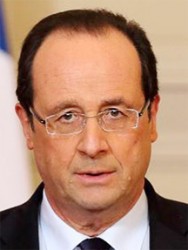TIMBUKTU, Mali/BAMAKO (Reuters) – Cheering, grateful Malians mobbed French President Francois Hollande yesterday as he visited French troops fighting Islamist jihadist rebels, and he pledged France would finish the job of restoring government control in the Sahel state.
In a one-day trip to Mali accompanied by his ministers for defence, foreign affairs and development, Hollande was hailed as a liberator in the ancient northern city of Timbuktu, which French and Malian forces retook from the rebels six days ago.
He also received a rapturous reception in the capital Bamako, where he said the Islamist fighters allied to al Qaeda had suffered heavy losses in a three-week-old French intervention that he ordered last month at Mali’s request.
Although the insurgents have been driven from Mali’s main northern towns, Hollande cautioned that the task of France’s military operation in Mali, codenamed Serval (Wildcat) and involving 3,500 soldiers on the ground, was not yet over.
“There is still a whole part of the north that remains unconquered … There are terrorist elements concentrated in some areas of the country, others who are dispersed. There are risks of terrorism. So, we have not yet finished our mission,” he told a news conference at the French ambassador’s residence.

He added France would withdraw its troops from Mali once the West African country had restored sovereignty over all its national territory and a UN-backed African military force, which is being deployed, could take over from the French.
“We do not foresee staying indefinitely,” he said, but he spelled out no specific time frame for the French mission.
Mali’s interim President Dioncounda Traore thanked “our brother” Hollande for launching the French intervention. It has cost the life of only one French serviceman so far and has driven the rebels into the mountains of northeast Mali.
“Together we will hunt the terrorists down to their last hiding place,” Traore said.
In Timbuktu, several thousand local residents in colourful robes and wraps sang and danced, shouting “Thank you, France” and “Papa Hollande”. In Bamako, there were similar scenes, with thousands cheering Hollande and waving French flags.
“Vive Hollande, Vive la France,” said one Bamako resident, Sidibe Lisa Camara. “Hollande our Saviour!” read one banner.
The United States and the European Union are backing the Mali intervention as a counter strike against the threat of Islamist jihadists using the inhospitable and ungoverned Malian Sahara as a launch pad for international attacks.
They are providing training, logistical and intelligence support, but have ruled out sending their own ground troops.
In Timbuktu, the Saharan trading town and seat of Islamic learning that spent 10 months under rebel occupation, Hollande visited the Djingarei-ber Mosque and the Ahmed Baba Institute, a library of ancient manuscripts that was ransacked by the rebels.
Hollande said it was essential that Timbuktu, a UNESCO World Heri-tage site, should be properly protected so that it could “shine” as a cultural treasure for the world.
Heavily armed French soldiers in armoured vehicles and Malian troops protected the French leader as he visited the mosque, which was built from mud bricks and wood in 1325.
“We have got our old lives back,” said Khalifa Cisse, the muezzin or crier who calls the faithful to prayer at the mosque.
Hollande has repeated that the French operation, where the ground forces are backed by warplanes, helicopters and armoured vehicles, aims to make way eventually for the larger multi-national African force, which is still being put in place.




